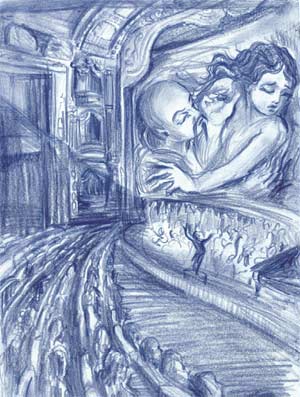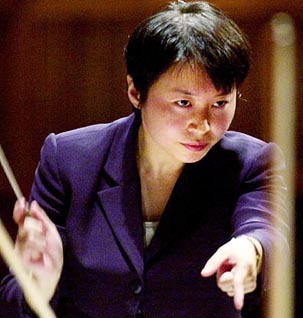Zhang and Civic deliver Bartok’s filmic barbarism

Xian Zhang—likely the only conductor to have held simultaneous podium positions in both Sioux City and Lincoln Center—was in Chicago this weekend for subscription concerts with the CSO and its training orchestra, the Civic Orchestra. Critical reaction has been underwhelming for Zhang’s appearances this week with the Chicago Symphony, but she could proudly leave town on Sunday after giving stalwart performances of Bartok and Beethoven at Orchestra Hall.
Spending significantly more time in Europe these days, Zhang’s international star is rising. It’s easy to see what the fuss is about: She is a hyper, vertically-mobile conductor who rewards audiences with kinetic and visceral plunges into the Romantic repertoire. Some of this, however, can come at the expense of idiosyncrasy.
Beethoven’s Symphony No. 2—the oft-neglected, latchkey kid of Beethoven’s symphonic cycle—was given driving treatment that all too frequently robbed the work of its mystery.
The opening movement was soberly drawn and remarkably efficient, but somewhat sterile in timbre. Zhang set out a serene and spacious landscape in the gorgeous Larghetto, drawing magnificent playing from the violins. The tautly mannered scherzo carried a certain charm, and the frenzied chaos of the final Allegro worked well to her strengths.
Yet the Second Symphony occupies an interesting place in Beethoven’s repertoire, serving as a prelude to what the composer was describing as “new paths” in his composition. Whatever signs of things to come are in this music, they weren’t always emphasized in Sunday afternoon’s performance.

Bela Bartok’s Miraculous Mandarin Suite filled in some of the holes left by the Beethoven: here there was a wild abundance of tonal color illuminating Bartok’s once-controversial 1927 pantomime ballet. While the structural and stylistic differences innate in the two composers’ music are great, Zhang sounded less inhibited in her approach and this highly eccentric music bloomed because of it.
She had plenty of help from a host of excellent young players in this mutable ensemble. Shouldering much of the load was clarinet soloist Ching-Chieh Hsu, whose nimble and seductive solo work could not have better evoked Menyhert Lengyel’s scuzzy underworld of deception and murder.
And that isn’t to deny the work’s beauty, either. Hsu was joined by other woodwinds who singularly captured the filmic qualities of this violent narrative—notably fellow clarinetist Brian Gnojek and bassoonist Drew Pattison, who delivered a flexible solo of his own.
The caterwauling, almost ghastly cries of the trombones and brass really set the imagination free, and wrapping the whole savage nightmare together was the handiwork of pianist Brett Rowe and celesta player Mio Nakamura. Zhang too was reliably consistent in her methods: In this music, she found a satisfying balance to attain what a New York Times critic once called a “civilized barbarism.”
Posted in Performances




